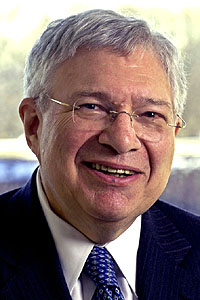Siegler, medical ethics pioneer, to deliver Ryerson lecture
By John EastonMedical Center Public Affairs
 Mark Siegler | |
In 1904, a lecture by the French vascular surgeon Alexis Carrel so impressed the chairman of physiology at the University that he immediately offered Carrel a teaching position at Chicago, where he applied himself to a fundamental surgical problem: how to stitch blood vessels together end-to-end. Carrel, who received the Nobel Prize in 1912, used his new technique to transplant a puppy’s kidney to the neck of an adult dog—the first organ transplant.
In its new home, connected to carotid artery and jugular vein, the transplanted kidney functioned for several hours. Soon, Carrel was able to transplant a heart. He later presented colleagues with a dog that had lived with another dog’s kidney for 17 months.
One hundred years later, Gary Becker—University Professor in Economics and Nobel laureate—suggested that a healthy person who donated a kidney to a human who needed one ought to be paid about $30,000. Somewhere in between, ethics happened.
At the 32nd annual Nora and Edward L. Ryerson Lecture, Mark Siegler, the Lindy Bergman Distinguished Service Professor in Medicine and Surgery and Director of the MacLean Center for Clinical Medical Ethics, will fill in the gaps. The lecture is set for 5:30 p.m., Tuesday, April 24, at the Max Palevsky Cinema in Ida Noyes Hall.
In his talk, “At the Crossroads of Organ Transplantation and Medical Ethics: A Century of Innovation at the University of Chicago,” Siegler will discuss how the field of transplantation—infused with difficult choices, allocation of scarce resources, social and economic disparities, and often considerable expense—has altered how the world thinks about medical ethics. He also will discuss how Chicago’s uniquely clinical approach to medical ethics has influenced transplant practice and policy.
The Ryerson Lectures grew out of a 1972 bequest to the University by Nora and Edward L. Ryerson, a former Chairman of the Board. It has become a “hallmark of the University,” said Hugo Sonnenschein, President Emeritus and the Adam Smith Distinguished Service Professor in Economics and the College, because of its “rich tradition in celebrating the work of our faculty.” It honors excellence in academic pursuits and the “high aspirations we hold for ourselves as a community of scholars.”
The faculty selects each Ryerson Lecturer based on a consensus that a particular scholar has made research contributions of lasting significance. In return, the Ryerson Lecturer is asked to reflect on his or her intellectual life and work.
An honors graduate of Princeton University, where he was recently named a trustee, and, since 1963, a member of the University community, Siegler has been a pioneer in developing the field of clinical medical ethics, which integrates the neat philosophical principles of ethics with the messy world of patient care.
He would agree with a quote attributed to Alexis Carrel: “A few observations and much reasoning lead to error; many observations and a little reasoning to truth.” As an observant young physician and director of the medical intensive care unit at the Medical Center in the early 1970s, Siegler was troubled that there were no ready answers to the many questions raised by students about topics such as informed consent or end-of-life care.
At the time, philosophers, theologians and legal scholars, not doctors, dominated the field of medical ethics. “Dr. Siegler,” recalled Leif Sorenson, former vice chairman of medicine in a 1997 profile, “took it as his mission, his task, to bring the two fields—that is bioethics and clinical medicine—closer together, so that each could learn from the other.”
Siegler soon coined the term “clinical medical ethics” and slowly but relentlessly began to shift the discussion from the theoretical to the practical, where it could provide context and guidance to patients and physicians faced with difficult choices. All clinical decisions have a moral component, he argued, and clinical practice requires balancing the technical demands of therapy with the personal and humane needs of the patient and family.
One area where the complexities of human relationships routinely overwhelm subtle philosophical distinctions is organ transplantation. In the 1989 journal paper, “Ethics of liver transplantation with living donors,” Siegler and colleagues described their plans to perform the first such surgery, laying out all of the potential ethical issues four months before the first such case.
Much of the success of such operations is due to the “extraordinary ethical analysis that proceeded and laid the ethical foundation for the first operation,” Sorenson wrote. A few years later, Siegler and a similar team of clinical ethicists and transplant surgeons set out the ethical guidelines for a paired kidney exchange, a way to enable willing but incompatible donors to contribute to the organ pool.
As the indications for organ transplantation continue to expand, clinical medical ethics will play a bigger role in determining how organs are acquired and allocated, Siegler said, and this means the world of medicine will need more trained ethicists. He is doing his part. In 1984, with support from the MacLean family, he and a few colleagues launched the MacLean Center for Clinical Medical Ethics, which quickly became the country’s leading center, training the next generation of academic leaders in clinical ethics.
Nearly 25 years later, the center has 25 faculty members drawn from throughout the University. The clinical fellowship program is the largest and most successful fellowship program in the world. More than 200 fellows have trained at the MacLean Center, of whom 35 now direct ethics programs at other universities and hospitals.
The center also pioneered the ethics consultation service, which helps clinicians deal with ethically challenging cases. It has become a trusted and valuable service and has been replicated at medical centers all over the world.
![[Chronicle]](/images/sidebar_header_oct06.gif)